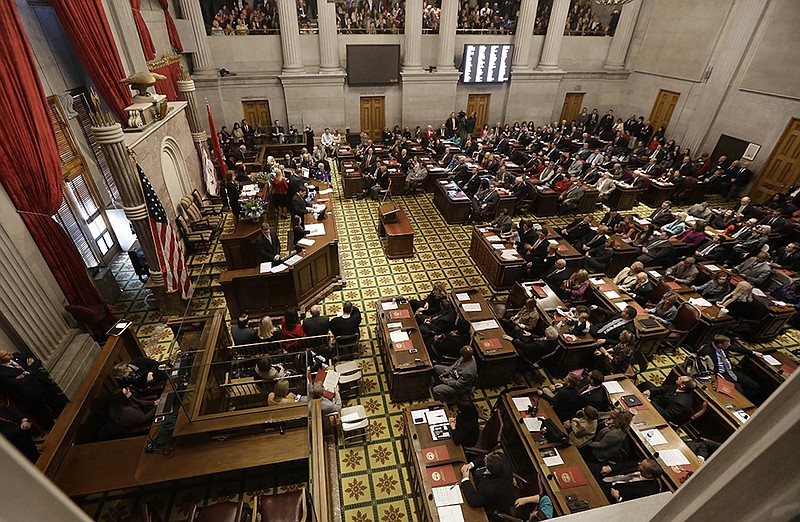Tennessee residents may get an opportunity in 2022 to vote to prohibit slavery in the state.
You read that right.
If two-thirds of members of both houses of the state General Assembly vote to approve Senate Joint Resolution No. 159 sometime later this year, citizens will be able to vote on the measure in 2022.
The resolution would amend the state constitution to say: "Slavery and involuntary servitude are forever prohibited. Nothing in this section shall prohibit an inmate from working when the inmate has been duly convicted of a crime."
Alert readers who notice the juxtaposition of the two seemingly unrelated phrases in the resolution are onto something. The slavery proposal relates to the current wording in the state constitution: "That slavery and involuntary servitude, except as a punishment for crime, whereof the party shall have been duly convicted, are forever prohibited in this state."
And if today's Tennesseans are wondering where the state may have gotten such wording, they need look no further than U.S. Constitution, where the 13th Amendment states, "Neither slavery nor involuntary servitude, except as a punishment for crime whereof the party shall have been duly convicted, shall exist within the United States, or any place subject to their jurisdiction."
As of 2019, when the General Assembly first passed the slavery/crime resolution, Tennessee was one of 12 states - including the liberal bastions of Minnesota, Oregon and Wisconsin - to have such a provision. Twelve other states allowed involuntary servitude as a criminal punishment, and Vermont permitted involuntary servitude to pay a debt, damage, fine or cost.
Sen. Raumesh Akbari, D-Memphis, introduced the constitutional amendment as a joint proposal in 2019. Eventually, it passed the Senate 32-0 and the House 97-0.
In the Volunteer State, a constitutional amendment requires a vote in each chamber of the Tennessee state legislature in two successive sessions with an election in between. During the first session, the constitutional amendment needs to receive a simple majority (50%+1) vote in each legislative chamber. During the second session, the constitutional amendment needs to receive a two-thirds vote in each chamber.
So, with the assumed second passage this year and the fall election in between, the amendment would be placed on the 2022 midterm ballot.
It is potentially only one of three constitutional amendments on the ballot. The other two await the same fate as the slavery/crime resolution. One is on how the state attorney general is selected, and the other concerns the legality of the speaker of the Senate or the speaker of the House carrying out the duties of the governor if the governor is unable to do so. They also were passed in 2019, will need passage by two-thirds of the Senate and House this year, and then can be put to voters in 2022.
Currently the attorney general is appointed by the state Supreme Court for a term of eight years. Senate Joint Resolution No. 1 would allow the Supreme Court to nominate an attorney general in open court and with votes recorded. The nomination then would be submitted to the General Assembly, where each house would need to confirm the nominee with a majority of its votes.
The attorney general would serve a term of six years rather than eight, must be at least 30 years old, must be a citizen of the United States, must have lived in the state for at least five years immediately before the nomination and must be a licensed attorney.
Senate Joint Resolution 154 clears up the legalese about the person who would assume the governor's duties should the governor be unable to carry out those duties. Currently, state law only stipulates what would happen upon a governor's death, resignation or removal from office but does not say what happens if none of those occurs but the governor is unable to carry out his or her duties (during, for example, an operation for a recoverable illness).
The resolution adds wording about the duties of the governor being temporarily discharged to the speaker of the Senate (or, if that office is vacant, the speaker of the House) but also makes it clear that the holder of either office upon assuming the duties of acting governor shall not forfeit their seats upon the governor's resumption of duties. Current state law, in Article II, says: "nor shall any person in this state hold more than one lucrative office at the same time," and, in Article III, says, "No person holding any office under this state shall execute the office of governor."
Of the potential three constitutional amendments, allowing the legislature a say-so on the attorney general is the biggest change. It provides both transparency on the selection of a nominee and a wider voice than just members of the Supreme Court on the nominee's confirmation.
On the other two, no one was going to mistake the punishment of a crime for slavery or was likely to deny a speaker the ability to resume duties once a governor regained capacity, but the first is important symbolically and the second is sound in a day when people are able to recover completely from once-fatal illnesses.
All three measures deserve second passage this year and affirmation by voters in 2022.
